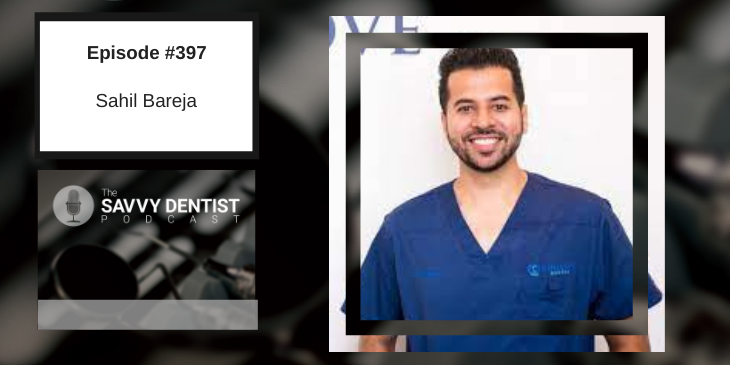If there were ways for you to increase your productivity and profitability while working less, you’d try it in a heartbeat, right? Sahil Bareja – practice owner, fully qualified Oral Therapist, and Director of NSW Dental Hygiene Association of Australia – this week’s podcast guest unpacks the business case for having an Oral Health Therapist and how oral health therapy services can be a crucial part of your dental practice.
He also shares his expert tips on onboarding and integrating an Oral Health Therapist into your practice, and explains what you stand to gain in terms of profit, productivity, and true business leverage.
In this episode we discuss:
- [8:53] – There is a perception that Oral Health Therapy is not a productive part of a practice, however Sahil spins this myth on its head and proves by personal experience how the role can not only be productive, but incredibly profitable.
- [16:53] – How to go from 6 days a week in your practice, to 4 days a week while increasing revenue and productivity.
- [20:48] – How to create a team that ‘thinks’ for themselves, and build a super-culture within your business. Motivating your team can be as simple as understanding human-nature.
- [25:19] – Having a culture of growth and learning makes all the difference in your team’s performance. So, what makes a great mentor, and what makes a great mentee within your business?
- [29:43] – What kind of revenue is possible if we make these changes and invest in our team and let them fulfil their potential?
- [35:09] – Sahil shares the lessons he has learnt, and the advice he has should you be keen to look deeper at an OHT.
Integrating Oral Health Therapy into Your Dental Practice
As the healthcare industry becomes increasingly interdisciplinary, it’s important for you and your team to consider partnering with other qualified dental health professionals to give your patients more personalised oral health care and to improve your dental practice holistically.
Oral Health Therapy (OHT) involves preventative and diagnostic measures to maintain oral health, including various dental treatments and services promoting good oral health and preventing dental problems. These can include oral health assessment, preventative advice, deep cleaning, periodontal therapy (gum disease treatment) and application of fissure sealants.
While you may have yet to feel this oral health professional is essential for reaching revenue goals, onboarding an oral health therapist into your practice has substantial benefits: improved patient outcomes, streamlined services, more efficient delivery models and greater profitability.
Onboarding an Oral Health Therapist
Oral health therapists are trained to handle a wide range of dental conditions in children and adults. They are trained to work independently or collaborate with other dental professionals to deliver comprehensive healthcare services.These practitioners were introduced to address an increasing demand for more preventive dental care.
Regular checkups and cleanings with an oral health therapist help catch early signs of dental diseases, ultimately reducing the risk of more considerable oral and general health issues.
Here’s how onboarding an OHT can increase your profitability:
1. Better Patient Retention
OHT provides patients with a comprehensive approach to dental care, which improves their overall experience in your practice. Patients satisfied with their care are more likely to return to your practice for future treatment. Also, preventive care patients are less likely to experience severe dental problems requiring costly treatment. This means that they will need less invasive treatments, which can translate into a decrease in treatment time and an increase in the frequency of patient visits.
2. Cost-effective Treatment
Treating gum disease in the early stages is less expensive than if it progresses to advanced stages, which require more invasive treatments. By providing preventive care, you can detect any issues early, preventing further damage and costly treatments.
3. Education for Patients
Patients who understand the importance of excellent oral health are more likely to take preventive measures. Education promotes patients’ overall well-being, which can lead to increased patient retention, word-of-mouth referrals and, ultimately, revenue growth.
4. Referrals from Hygienists and Dental Therapists
Since hygienists and dental therapists work closely with patients, they can identify potential issues that require immediate attention. They can then refer such patients to you for necessary treatment. With more referrals, your patient base will increase, leading to an increase in revenue.
5. Expanded Services
Providing therapy services means that you are expanding your services beyond just traditional dental treatments. This move can attract patients who are looking for comprehensive dental care. Growing the types of therapies can attract a broader scope of patients and ensure that your current patients receive high-level dental care in-house despite their specific oral health needs.



